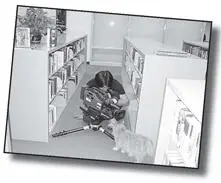As soon as she left home, my relationship with Jodi improved dramatically. We were great friends, we realized, and terrible roommates. But while we laughed about the present, we still didn’t talk about the past. Maybe mothers and daughters never do. That didn’t mean I couldn’t try.
“I know we’ve had some hard times, Jodi.”
“What are you talking about, Mom?”
Where should I start? My health. My absences. Her messy room. Brandy. “In Mankato. Remember? We would walk by a store and you’d say ‘I really want that shirt, Mommy, but I know we don’t have any money, so that’s okay.’ You didn’t want it, you needed it, but you never wanted me to feel bad.” I sighed. “You were only five years old.”
“Oh, Mom, that’s just life.”
And right then I realized that she was right. The good, the bad, that’s just life. Let it go. There’s no need to fret about the past. The question is: who are you going to share it with tomorrow?
That night, after the party, Jodi and I took Scott to the library to meet Dewey. That’s when I knew this relationship was serious; Jodi had never introduced Dewey to one of her boyfriends before, and none of her other boyfriends, as far as I knew, had ever been interested in meeting him. Dewey was, of course, overjoyed to see Jodi. She was forever his love. Scott gave the two of them time together, then gently picked Dewey up and petted him. Not on the stomach, which Dewey hated, but along the back. He walked him around the empty library in the Dewey Carry. He pulled out his camera and took a snapshot for his mother. She had heard the Dewey stories, and she was a big fan. My heart warmed to see the two of them together. Scott was so loving and tender. And how could I not fall for a guy thoughtful enough to take a photograph for his mom?
It never occurred to me there was anything unusual about taking a grown woman’s boyfriend to a library to meet her mother’s cat. Dewey was part of the family; his opinion mattered. How could anyone seriously consider being a part of this family without knowing him? And I trusted Dewey to sniff out a rat; he was my sentry, always protecting the ones he loved. Seeing Scott with Dewey, and Dewey with Scott, told me everything I needed to know.
It also never crossed my mind, at this point, to think of Dewey as the library’s cat. Dewey was my cat. I was the person he came to for love. I was the person he came to for comfort. And I went to him for love and comfort, too. He wasn’t a substitute husband or a substitute child. I wasn’t lonely; I had plenty of friends. I wasn’t unfulfilled; I loved my job. I wasn’t looking for someone special. It wasn’t even that I saw him every day. We lived apart. We could spend whole days in the library together and hardly see each other. But even when I didn’t see him, I knew he was there. We had chosen, I realized, to share our lives, not just tomorrow, but forever.
Dewey was more special to me than any animal I had ever known. He was more special to me than I ever believed an animal could be. However, that didn’t change a fundamental truth. He was my cat, but he belonged in the library. His place was with the public. Dewey was happy at my house for a day or two, but as soon as we got in the car and headed downtown to the library, he put his front feet on the dashboard and stared excitedly out the window. I had to take the turns slowly, or he’d slide right off. When he smelled Sister’s Café, Dewey knew we were a few blocks away. That’s when he got really excited. He’d move to the armrest and put his paws on the side window, practically willing the door to open. We’re here! We’re here! He’d look over his shoulder and practically yell it to me when we entered the alley. As soon as the door opened, he jumped into my arms and I carried him across the threshold. And then . . . bliss.
There was nothing Dewey loved more than being home.
Chapter 22
Dewey Goes to Japan

We received the e-mail from Japan in early 2003. Actually, the e-mail came from Washington, D.C., on behalf of people in Tokyo. Tomoko Kawasumi represented Japanese Public Television, which wanted to film Dewey. The company was making a documentary to introduce some new high- definition technology, and they wanted as wide an audience as possible. They decided first on a documentary about animals, then narrowed the focus to cats. They discovered Dewey through a feature in the Japanese magazine Nekobiyori . Would we mind if a film crew came to Spencer for a day?
That’s funny, we had no idea Dewey had appeared in a Japanese magazine.
A few months later, in May, six people from Tokyo arrived at the Spencer Public Library. They had flown to Des Moines, rented a van, and driven to Spencer. Iowa in May is beautiful. The corn is just below eye level, three or four feet tall, so you can see the fields spreading into the distance. Of course, it’s two hundred miles from Des Moines to Spencer, and that’s all you can see, mile after mile. What were six people from Tokyo thinking after three and a half hours of looking at Iowa corn? We’d have to ask them, because they were probably the only people from Tokyo ever to make that drive.
The crew had one day to film, so they asked me to arrive at the library before seven. It was a miserably rainy morning. The interpreter, the only woman in the group, asked me to open the first set of doors so they could set up their cameras in the lobby. As they were carting equipment, around the corner came Dewey. He was half asleep, stretching his back legs as cats often do when they first wake up. When he saw me, he trotted over and gave me a wave. Oh, it’s you. What are you doing here so early? I wasn’t expecting you for twenty minutes. You could have set your watch by that cat.
Once the crew set up the cameras, the interpreter said, “We’d like him to wave again.”
Oh, brother. I tried to explain, as best I could, that Dewey waved only once, when he saw me first thing in the morning. The director, Mr. Hoshi, wouldn’t hear of it. He was used not only to giving orders but to having them obeyed. He was definitely the man in charge. And right now, he wanted that wave.
So I went back to my car and approached the library again, pretending I hadn’t been in that morning. Dewey just stared at me.
What? You were just here five minutes ago.
I entered the library, turned on the lights, turned off the lights, went back to the car, waited five minutes, and approached the library again. Mr. Hoshi thought this might fool Dewey into thinking it was the next day.
It didn’t.
We tried for an hour to get footage of Dewey waving. Finally I said, “Look, the poor cat has been sitting there this whole time waiting for his food. I have to feed him.” Mr. Hoshi agreed. I scooped Dewey up and rushed to the litter box. The last thing I wanted the Japanese to get on film was flying poop. Dewey relieved himself, then ate a leisurely breakfast. By the time he was finished, the camera crew was set up inside. They had come halfway around the world, and they never got their wave.
But they got everything else. Dewey was almost fifteen years old and he was slowing down, but he hadn’t lost his enthusiasm for strangers. Especially strangers with cameras. He approached each member of the crew and greeted him with a rub on the leg. They were petting him, horsing around, and one cameraman lay down on the floor for a Dewey-eye view. The interpreter politely asked me to put Dewey on a bookshelf. He sat there and let them film. He jumped from shelf to shelf. Then she said, “Have him walk down the shelf between the books and jump off the end.”
Читать дальше













